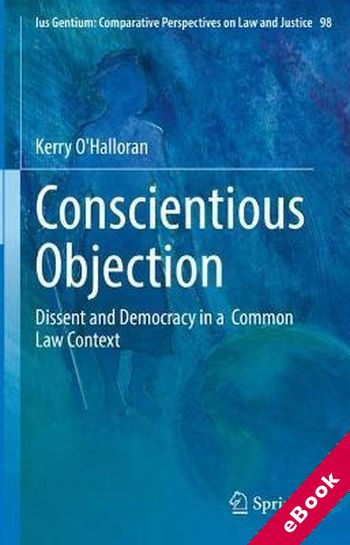
The device(s) you use to access the eBook content must be authorized with an Adobe ID before you download the product otherwise it will fail to register correctly.
For further information see https://www.wildy.com/ebook-formats
Once the order is confirmed an automated e-mail will be sent to you to allow you to download the eBook.
All eBooks are supplied firm sale and cannot be returned. If you believe there is a fault with your eBook then contact us on ebooks@wildy.com and we will help in resolving the issue. This does not affect your statutory rights.
This book traces, assesses and compares the history of conscientious objection - in the cultural context of six common law nations - from refusal of military service and a range of similar moral dilemmas, to objecting to abortion, to the current social polarisation surrounding vaccination hesitancy in the COVID-19 pandemic.
It considers the impact of this form of dissent in relation to social movements like Black Lives Matter, social activists such as Gandhi, and whistle blowers like Daniel Ellsberg. It reflects on the relationships between the sacred and the secular, the state and the citizen, in order to better understand the responsibilities of citizenship in our increasingly secular societies. It analyses what defines the conscientiousness of an objection from both legal and ethical standpoints. It examines what constitutes a matter of conscience, why this should justify exemption from civic duties and why this form of dissent has such a time-honoured status. It explores the increased reliance on "grounds of religion, belief or conscience" as providing justification for excusing some citizens from complying with certain responsibilities - mandated by equality and non-discrimination legislation - that are binding for all others.
By conducting a comparative evaluation of national law and judicial rulings on a fixed agenda of issues, this book identifies key jurisdictional differences concerning conscientious objection. In so doing, it highlights the importance of cultural context and constructs a jurisdiction-specific overview of legislation, policies and case law. By tracking policy developments and highlighting crucial judicial rulings - particularly in the US - it provides insights into the probable future direction of developments in national law relating to conscientious objection.
Lastly, the book draws attention to some of the potential consequences of manifesting dissent by opting out of performing public services - e.g. the possible local breakdown of specific service availability (e.g. abortion, officiating at same-sex marriages, and immunisation); prompting population movements as established democratic civil rights are locally negated (reproductive rights, LGBT rights, right to health protection); fragmenting society into a geographic patchwork of regions in which some citizens are branded as conservative/reactionary and others as progressive; and fuelling the culture wars - with profound implications for a coherent democratic society.